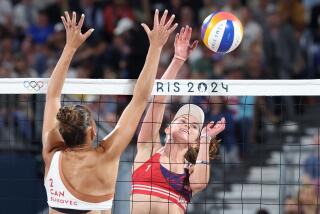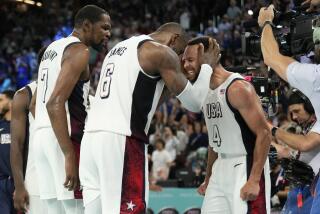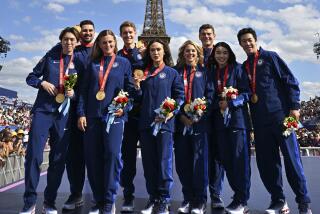THE SEOUL GAMES : U.S. Starts Slowly, Defeats Japanese : Volleyball Team Wins in Three Games; Netherlands Next
- Share via
SEOUL — As Coach Arie Selinger and his Dutch team watched from high in the bleachers at Hanyang University, the U.S. men’s world-champion volleyball team, all 12 members of which are Californians, began play Sunday in the Summer Olympics with a 3-0 victory over Japan.
After the first game, the victory came as easily as expected for the defending Olympic champions, who won for the 38th straight time against the Japanese, 15-13, 15-2, 15-2.
The United States now turns its attention to Monday’s game against the Netherlands, which is making a rare Olympic men’s volleyball appearance. The fact that the Netherlands suddenly is considered a medal contender has been credited to Selinger, who coached the U.S. women to the silver medal in 1984.
He was not signed to a new contract after the Los Angeles Olympics, his relationship with the U.S. Volleyball Assn. (USVBA) having deteriorated primarily because of his dominating personality.
Selinger, who makes his home with his wife in Orange County when he isn’t with the team in Amsterdam, did everything but take out a want ad when the USVBA was looking for a men’s coach to replace Marv Dunphy, who is returning to Pepperdine after the Olympics. But Selinger was not considered. So a victory over the heavily favored U.S. men might be considered vindication for him.
Although he is recognized as a motivator almost without peer within the sport, the U.S. players did not seem concerned after their victory over Japan that he would make much difference in Monday’s match.
That doesn’t mean they that they don’t respect the Netherlands, which upset France, 3-1, in its opener Saturday. It’s just that they think the match will be won or lost on the court and not the bench.
“Arie did a good job for our women, and he’s done a good job for the Dutch men,” said outside hitter Karch Kiraly of Santa Barbara. “But it’s the team we play, not the coach.”
Working their way east to beat the jet lag, the U.S. men played two matches against their opening-round opponents in Japan before arriving in Seoul. After being challenged in neither, they didn’t expect the Japanese would make this one a match, either.
But the U.S. men might have been a little overconfident at the outset, although it’s possible that it took them a game or so to react to the loss of veteran setter Jeff Stork of Topanga Canyon, who is out with a sore back. Dunphy said that Stork might play against Monday. Japan led, 10-6, at one point in the first game and held off two match points before losing. After that, the Japanese appeared to call it a morning as the U.S. men began to look like the team that is ranked No. 1 in the world.
“I think once we got settled down, they knew they were in for a loss,” Kiraly said.
Dunphy said he didn’t believe that his players were adversely affected by having to play at 9:45 a.m. (Seoul time), scheduled to suit Saturday night television audiences in the United States. He said the team practices from 8 a.m. to noon when they are at their San Diego training camp.
“A little coffee never hurts,” said middle blocker Craig Buck of Tarzana.
The U.S. men seemed more concerned about a new rule that places the responsibility of keeping the court dry on the players. To keep the matches moving for television purposes, the International Volleyball Federation (FIVB) requires players to wipe sweat off the court with towels during breaks instead of attendants.
As a team can be charged with a timeout if the process takes too long, the players sometimes choose to leave the sweat on the court, creating hazards for them.
“We’re risking serious injuries because the FIVB wanted to speed up the game for TV,” Buck said.
Complained outside hitter Steve Timmons of Newport Beach: “In the job application, it says volleyball player, not floor wiper.”
More to Read
Go beyond the scoreboard
Get the latest on L.A.'s teams in the daily Sports Report newsletter.
You may occasionally receive promotional content from the Los Angeles Times.






